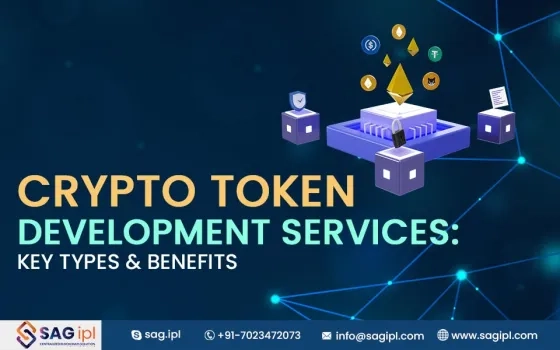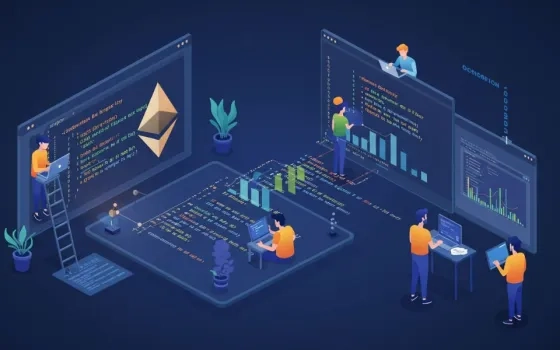In the digital finance revolution, crypto tokens have become crucial assets, transforming industries through blockchain technology. Whether used for transactions, investments, governance, or representing real-world assets, crypto tokens play a significant role in decentralized ecosystems. With the increasing adoption of blockchain-based applications, businesses and individuals must understand the different types of crypto token development services and their benefits.
This article explores the fundamentals of crypto token development, highlighting the various types of tokens, their applications, and the advantages they offer to businesses and investors alike.
Understanding Crypto Tokens
A crypto token is a digital asset created on an existing blockchain network, enabling functionalities beyond mere currency transactions. Unlike standalone cryptocurrencies such as Bitcoin and Litecoin, tokens operate on platforms like Ethereum, Binance Smart Chain, and Solana. They can represent anything from utility and ownership rights to voting privileges and digital collectibles.
Crypto tokens have gained popularity due to their ability to facilitate decentralized finance (DeFi), enhance asset liquidity, and provide innovative fundraising mechanisms. Their programmability through smart contracts allows for automation, security, and transparency in various financial and non-financial applications.
Types of Crypto Tokens
Crypto tokens come in several forms, each serving a unique function. Below are the most common types:
1. Utility Tokens
Utility tokens provide access to a specific product or service within a blockchain ecosystem. Unlike traditional currencies, these tokens are designed to enable transactions within a particular platform rather than serve as an investment vehicle. Users can use utility tokens to pay for services, access premium features, or participate in decentralized applications (dApps).
Examples:
- Basic Attention Token (BAT): Used in the Brave browser ecosystem to reward users for viewing advertisements.
- Filecoin (FIL): Allows users to purchase decentralized cloud storage space.
2. Security Tokens
Security tokens represent ownership in an asset, similar to traditional financial securities like stocks, bonds, or real estate. These tokens are subject to securities regulations and offer investment opportunities, dividend payments, and profit-sharing models. By digitizing assets, security tokens enhance liquidity and make investments more accessible to global markets.
Examples:
- tZERO (TZROP): A security token offering equity ownership in the tZERO trading platform.
- Polymath (POLY): Provides a framework for businesses to create compliant security tokens.
3. Stablecoins
Stablecoins are designed to minimize price volatility by pegging their value to stable assets such as fiat currencies (USD, EUR) or commodities (gold, silver). They serve as a bridge between traditional finance and cryptocurrencies, enabling secure and stable transactions.
Types of Stablecoins:
- Fiat-collateralized: Backed by reserves of fiat currency (e.g., USDT, USDC).
- Crypto-collateralized: Backed by other cryptocurrencies as collateral (e.g., DAI).
- Algorithmic: Stabilized through smart contract algorithms that control supply and demand.
4. Governance Tokens
Governance tokens give holders voting rights and decision-making power within a blockchain protocol. They are commonly used in decentralized autonomous organizations (DAOs) and DeFi projects to allow community participation in protocol upgrades, funding allocations, and governance policies.
Examples:
- Uniswap (UNI): Allows users to vote on changes to the Uniswap decentralized exchange.
- MakerDAO (MKR): Enables governance over the MakerDAO lending protocol and its stablecoin, DAI.
5. Non-Fungible Tokens (NFTs)
NFTs are unique digital assets that represent ownership of specific items such as art, music, gaming assets, and virtual real estate. Unlike fungible tokens, which are interchangeable, each NFT carries distinct metadata that makes it one-of-a-kind.
Examples:
- CryptoPunks: A collection of pixelated digital characters with unique traits.
- Bored Ape Yacht Club: Exclusive NFT membership granting access to events and benefits.
6. Payment Tokens
Payment tokens function as digital currencies, allowing users to transact without intermediaries. These tokens aim to facilitate fast, secure, and low-cost transactions globally.
Examples:
- Bitcoin (BTC): The first and most widely recognized cryptocurrency used for payments and store of value.
- Litecoin (LTC): A faster alternative to Bitcoin with lower transaction fees.
Benefits of Crypto Token Development
Developing and utilizing crypto tokens offer a range of benefits, from financial accessibility to improved security and efficiency.
- Enhanced Liquidity: Tokenizing assets increases liquidity by enabling fractional ownership and easy transferability. Real estate, artwork, and company shares can be tokenized, allowing investors to buy and sell smaller portions without requiring full ownership.
- Decentralized Finance (DeFi) Opportunities: Crypto tokens drive DeFi applications, providing users with decentralized lending, staking, and yield farming opportunities. DeFi eliminates intermediaries, reducing costs and increasing accessibility to financial services worldwide.
- Efficient Fundraising Mechanisms: Tokens enable innovative fundraising methods such as:
- Initial Coin Offerings (ICOs): Projects raise funds by selling utility tokens to investors.
- Security Token Offerings (STOs): Companies issue tokenized securities compliant with regulatory frameworks.
- Initial Exchange Offerings (IEOs): Exchanges conduct token sales on behalf of startups.
- Transparency and Security: Blockchain technology ensures all token transactions are recorded immutably, reducing fraud and improving accountability. Smart contracts automate transactions, eliminating the need for trust in third parties.
- Programmability and Automation: Smart contracts enable programmable functionalities such as automated payments, token burns, governance participation, and dividend distributions, making business processes more efficient.
- Cost-Effective Transactions: Traditional banking systems involve high fees for cross-border transactions. Crypto tokens enable fast, low-cost international transfers without intermediaries.
Considerations in Crypto Token Development
While crypto token development offers numerous advantages, certain factors must be considered to ensure success.
- Regulatory Compliance: Different jurisdictions impose varying regulations on crypto tokens. Ensuring compliance with legal frameworks (e.g., SEC guidelines for security tokens) is crucial to avoid legal risks.
- Smart Contract Security: Well-audited smart contracts prevent vulnerabilities that could lead to hacks, fund losses, or malicious exploitation.
- Token Economics (Tokenomics): Designing a sustainable tokenomics model ensures a token’s long-term viability. Factors like supply, demand, incentives, and distribution models must be strategically planned.
- Market Adoption and Community Engagement: The success of a token depends on its adoption. Strong marketing strategies, partnerships, and community engagement drive demand and long-term value.
Real-World Applications of Crypto Tokens
- Decentralized Finance (DeFi): Crypto tokens power lending, borrowing, staking, and liquidity pools in DeFi platforms like Aave, Compound, and SushiSwap.
- Gaming and Metaverse: NFTs and in-game tokens drive blockchain gaming economies (e.g., Axie Infinity, Decentraland).
- Supply Chain Management: Tokenization enhances transparency and traceability in supply chains (e.g., VeChain’s blockchain solution).
- Identity Verification: Crypto tokens enable secure digital identity management, reducing fraud risks.
Conclusion
Crypto tokens have redefined digital asset management, offering numerous opportunities for businesses and individuals. From enhancing financial accessibility to powering decentralized applications, their impact continues to grow across industries. As blockchain adoption expands, understanding the different types of tokens and their benefits is crucial for anyone looking to navigate the evolving crypto landscape.
Whether for investment, transactions, or governance, crypto token development remains a cornerstone of blockchain innovation, shaping the future of digital economies worldwide.
















